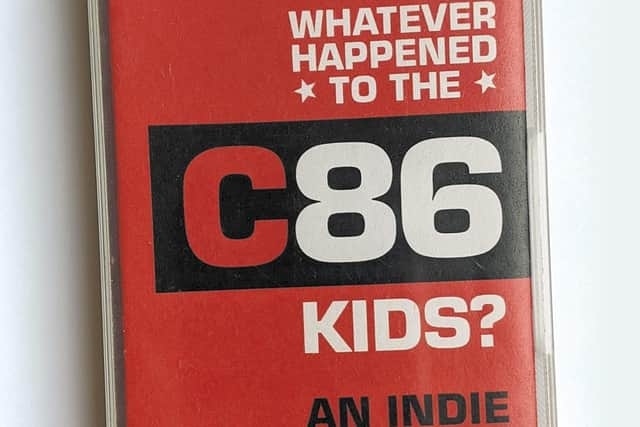Euan McColm: Don't forget your teenage dreams and the power of optimism
If these names mean nothing to you, I can hardly hold it against you. These were pop groups which existed for the briefest of moments in time and never threatened to trouble the compilers of the weekly top 40 chart.
But for some of us - of a certain age - they once were heroes. They - and countless other bands - were at the forefront of a quiet revolution in music.
Advertisement
Hide AdAdvertisement
Hide AdIn the mid-1980s, while major labels pumped millions into the careers of the big-sellers of the day such as Madonna, Dire Straits and Michael Jackson, across the UK, a network of tiny independent companies emerged, releasing a slew of records by bands which, without their support, would have languished in provincial obscurity.


These labels - inspired by pioneers such as Rough Trade in London, Postcard in Glasgow, and Fast Product in Edinburgh - were the bedrock of what became known as Indie music. In 1986, the New Musical Express gathered together 22 bands seen as representative of this new scene, put their tracks on a tape, and sold it to readers for a couple of quid.
The tape - C86 - was to be a surprise smash hit. The NME sold thousands by mail order and, a few months later, Rough Trade stepped in to put it out on vinyl.
My cassette is long since gone, chewed up by an in-car tape deck, but my copy of the LP still gets the occasional outing.


The blame for my recent reconnection with this wonky, uneven - there are gems within but forgettable moments, too - compilation lies with author Nige Tassell, who’s just published a rather brilliant book.
Whatever Happened to the C86 Kids - An Indie Odyssey is part detective story and part love letter. Tassell set out to interview members of all 22 bands featured on the compilation. Some of these quests were more easily accomplished than others. He was already on friendly terms with Nigel Blackwell - the genius who leads the perennially brilliant Half Man Half Biscuit - and David Gedge of The Wedding Present so quick phone calls were enough to set up the necessary meetings. Others, still making music - such as Stephen McRobbie of The Pastels, whose most recent record made the shortlist for Scotland’s Album of the Year - were not difficult to find.
But in some cases, the trail had gone cold. Men and women who had - almost 40 years ago - dreamed of pop stardom were now living in obscurity. In some instances, tragically, they were no longer alive. But, thanks to Tassell’s tenacity, every band which contributed to the tape is represented by at least one member.
Yes, this is a book that will appeal to nostalgists, of which I am one. It brought back to me the most vivid memories. Poring over the stories within, I recalled the precise circumstances in which I bought records by those C86 bands I loved (Primal Scream’s first single All Fall Down in Listen on Glasgow’s Renfield Street on a wet Saturday; The Pastels’ Truck Train Tractor from A-One, a few hundred yards away, on a gloriously sunny morning). I thought of my teenage obsession with my hair, which I would have cut into a Morrissey-style quiff at the hairdresser in Lewis’s department store on Argyle Street before growing it out into a shaggy mop as favoured by Jim and William Reid of The Jesus and Mary Chain and then repeating the process.
Advertisement
Hide AdAdvertisement
Hide AdI lingered over the memory of an evening in Darlington (where I lived for a couple of years in the 90s) when my late mother - never much of a drinker - got spectacularly pissed on gin and bitter lemon during a visit and, struggling to keep her balance on a chintz sofa, demanded I play Primal Scream’s Velocity Girl over and over and over while trying and failing to eat mulligatawny soup from a plate because it had never occurred to me to buy bowls. I was later to lose my deposit thanks to the state of the upholstery.
But Tassell’s book is no mere trip down memory lane. At its most compelling, it’s a celebration of optimism.
Sure, some of those he meets are spiky. Some old tensions live on. There are barbs - some subtle, some less so - about former bandmates from some of the participants. But others retain an enthusiasm for making music that’s both touching and inspiring. And, in many cases, friendships forged over a shared love of playing, endure, decades later.
When we are young, if we are lucky, the world seems full of possibilities. Experience can swiftly beat that out of us. And, if we allow that to happen, we become vulnerable to the influence of those ugly twins, cynicism and bitterness. At times, I’ve almost been seduced by their whispers. Haven’t you?
Few of those who appear in Tassell’s book succeeded in the music business. In most cases their stars burned out quickly. Some never ignited. But many continue to succeed in other ways, finding fulfilment and joy in creating music that might never make their fortunes but which enriches their lives.
You hardly need me to tell you that we live in uncertain and troubling times. For many of us, simple peace of mind is hard to find.
This being so, it would be trite to suggest there’s some easy fix. If you feel angry about the world, then you may well have very good reasons.
But, in the stories of many of those C86 kids, are reminders of the power of optimism. If we can, we should guard against losing our belief in possibility.
Comments
Want to join the conversation? Please or to comment on this article.
